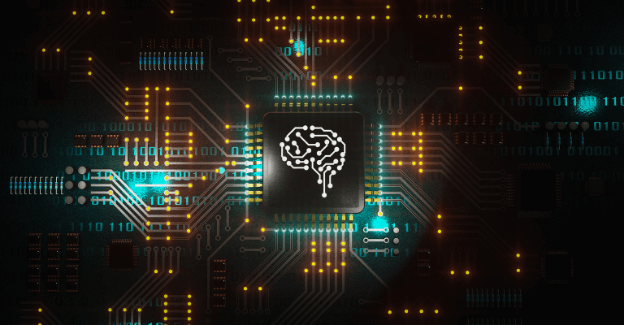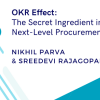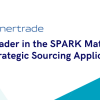How Organizations are Driving Value from Procurement With AI
Keith Hausmann, Chief Revenue Officer, Globality, explains how the AI revolution is transforming the way companies source complex categories – typically services, delivering faster, better decisions; more autonomy for stakeholders; and greater opportunities for procurement professionals to drive innovation.
With the huge volatility seen in today’s business environment – and in the world more generally – global enterprise companies are facing unprecedented challenges. They need to increase their adaptability and resilience to withstand future economic shocks, all while keeping costs down and driving innovation in order to remain competitive.
To succeed in these demanding conditions, many businesses are turning to AI (artificial intelligence) and automation in order to find ways to improve decision-making, accelerate routine processes, and free up their people to focus on driving more strategic problem-solving and growth-related activities.
Given AI’s seemingly limitless potential, no wonder that it’s being increasingly used by procurement functions. But, thus far, their use of this technology has been limited to simpler spend categories and has tended to focus on moving traditional analog processes online, rather than achieving anything more transformative.
However, with advances in the technology and our understanding of it, it is now possible for procurement to go several steps further and tackle the more complicated and potentially more valuable challenge of sourcing complex, ambiguous categories of spend, such as consulting, marketing, technology or professional services. This trend can be seen with global Fortune 500 companies BT and Aquanima (part of the Santander Group) recently adopting AI-driven platforms for their services sourcing.
Applying AI to Complex Category Sourcing
Complex category sourcing, particularly in services spend areas, presents such a challenge because the requirements tend to be highly qualitative, outcome based, evolving and potentially difficult to define. This is particularly true when sourcing knowledge-based services, such as IT, consulting, marketing and legal.
However, given the substantial cost of such services and the value that could be generated from improved efficiencies, the potential benefits are huge. Put simply, AI can benefit organisations by helping them to make better decisions and to make those decisions more quickly.
By sidestepping human limitations in processing data, AI can massively expand the accuracy and speed of identifying potential suppliers considered for shortlisting, thus helping businesses to go beyond easy, obvious and often sole-source picks and to make genuinely new, potentially more innovative, unbiased and better-value choices.
And by applying analytics to information already available, improving the scoping of requirements, and checking these requirements against prequalified suppliers, AI can reduce request for proposal (RFP) cycle times by as much as 50%.
These benefits in the speed and quality of decision-making will only improve over time because AI can remember previous decisions and draw lessons from the outcomes. And since all procurement decisions are brought together into one platform, increased visibility across teams and functions means faster, higher-quality insights about relevant suppliers and a greater likelihood of quick, well-informed responses. Data can also be used for stakeholder reviews to inform future supplier selection decisions.
Empowering Business Functions
The potential benefits of applying AI to the sourcing of complex categories are, for the business as a whole, compelling. Transforming the experience, and outcomes, of buying complex services categories will deliver tangible benefits throughout the wider organization.
By harnessing the power of AI, companies can liberate and empower their people across different functions to do their own sourcing, giving them the autonomy they want, while also guiding them – through intuitive, consumer-like interfaces and tools – to follow policies, guidelines and best practice in a way that would previously have felt inhibiting and onerous.
And the latest sourcing technology can also help business stakeholders who are new to the procurement process to get what they want quickly and easily. By using natural language processing (NLP), AI translates everyday-language descriptions, of the kind that may be used by those in the business, into a technical specification that a supplier can quickly understand and address, saving time and resource for both parties, and reducing the risk of misunderstandings.
Creating Value from Suppliers
It is not just those within the business who can benefit from the implementation of AI.
For suppliers, too, the shift away from traditional costly and time-consuming RFP processes, presents them not only with the opportunity to avoid wasted efforts, often regurgitating answers to questions that can be found in multiple public sources, but also to create better and more innovative proposals to potential clients. The increased flexibility of AI allows them to put forward more creative solutions rather than simply responding in rote fashion to a tightly structured RFP and spending time on questions that are not germane to the topic.
AI helps throughout the whole proposal process and beyond. Information given or changes made by the supplier in response to buyer requests can be processed dynamically and automatically reflected in all the information held and in any draft contracts, reducing the risk of unwelcome surprises.
In this way, AI helps businesses get better work from their suppliers with fewer unexpected issues so procurement professionals can spend less time fighting fires and focus instead on plotting a path to creating greater strategic value for their organizations.
Transforming the Procurement Function
As AI automates more of the transactional process management work that those in procurement have traditionally done, there is some understandable anxiety about the future of the profession. By reducing repetitive processes and cutting the time required to deal with no-longer-fit-for-task legacy technology, AI can help CPOs and their teams focus on those higher-value tasks that deliver greater returns to their organizations.
As well as problem solving, and overseeing and advising on higher-value projects, procurement professionals can explore the transformational activities that are becoming central to the function’s mission: building more collaborative relationships with strategic suppliers; increasing sustainability, agility and resilience; promoting innovation; and delivering increased long-term growth.
By investing in AI now, procurement leaders will be able to get a head start on this journey, giving their organizations an edge over their competitors, transforming the function’s value proposition, and greatly enhancing the power of their people.









